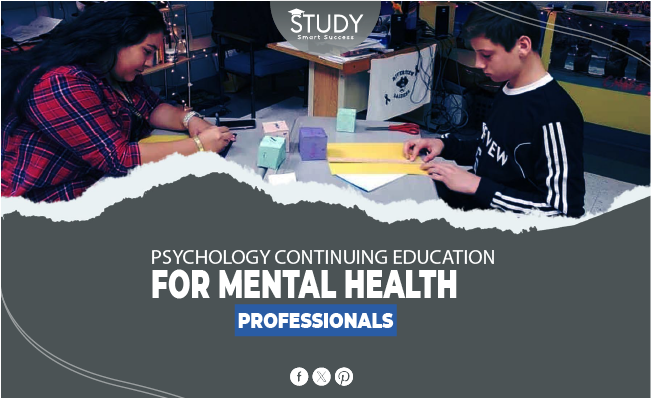The research, beliefs, and professional practices of psychology change constantly. Professional progress for psychologists, therapists, and other mental health providers requires keeping up with these changes. Psychology Continuing Education should begin right away.
Learn Forensic Psychology Education Requirements.
In this comprehensive guide to psychology continuing education, we’ll cover everything. It improves work and patient care while meeting CE criteria.
Understanding Psychology Continuing Education Requirements
Continuing education in psychology is meant to ensure that experts stay current on the latest research, social standards, and treatment methods in their area. There are big differences between states and countries regarding continuing education standards. Each place sets its own rules for the number of hours needed, the types of courses that count, and how long you have to update your license.
To keep their credentials current, mental health workers need to know exactly what continuing education (CE) their licensing board requires. This usually includes classes, training, lectures, and sometimes the chance to study independently. Psychologists and therapists can not only follow the rules but also greatly improve the level of care they give their clients by keeping current on ongoing education and taking the initiative to do it.
The Importance of Continuing Education in Psychology
Continuing education in psychology is important for many reasons, such as ensuring license standards are met and encouraging personal and career growth. Mental health workers can do the following things better by continuing to learn:
- Know What’s New: Stay current on the newest studies, therapy methods, and best practices in the field.
- Improve Skills: To give the best care, learn new skills, and improve at the ones you already have.
- Ethical Practice: Learn more about the ethical problems that come up a lot in mental health work and how to deal with them.
- Network: Get in touch with other professionals and experts in your field. This will help you work together and build a community.
How to Find Quality Psychology Continuing Education Courses
There are so many psychology CE companies and classes that it can take time to choose the right one. Think about the following things to make sure you spend your time and money wisely:
- Accreditation: Look for courses approved by recognized psychology and mental health education accreditation bodies. These courses meet rigorous standards of quality and relevance.
- Relevance to Your Practice: Select courses that align with your areas of expertise, interest, or professional development goals.
- Mode of Delivery: Consider whether online courses, live workshops, webinars, or in-person conferences best suit your learning style and schedule.
- Provider Reputation: Research the course provider’s credentials and reputation in the field. Peer recommendations can also be invaluable in finding quality CE opportunities.
Balancing CE with Professional Practice
Many therapists and psychologists need help to fit ongoing education into their busy work schedules. Here are some ways to help you handle these obligations:
- Planin psychology: At the start of your license cycle, list your CE needs and due dates. This lets you spread out your learning activities without rushing around at the last minute.
- Integrate Learning: Look for ways to use what you’re learning in your work immediately. This not only helps you remember what you’ve learned, but it also makes things better for your clients.
- Take care of things: Organize your finished CE points, awards, and other paperwork so that you can keep track of them. Getting a new card will be easier when the time comes.
Popular Topics in Psychology Continuing Education
The variety of CE options in psychology shows how broad the area is. The following are some famous fields of study:
- Cultural Competency: You can improve your ability to provide culturally aware care by taking classes on how to work well with people from different backgrounds.
- Technological Progress: With tools like teletherapy and digital evaluations, it’s becoming increasingly important to understand how technology affects psychology.
- Ethical and Legal Issues: All mental health care workers need to be able to deal with the complicated legal and moral issues in the field.
Leveraging Continuing Education for CareeContinuing
Ogy continuing education in psychology can greatly affect your job path, even if it’s just to meet licensing standards. Taking more advanced classes, getting a diploma, or specializing can lead to new job possibilities, leadership roles, and areas of practice.
Conclusion
Continuing education in psychology is important to how mental health workers keep growing. You can meet the requirements for your license and greatly improve your professional practice and the care you give to clients by carefully selecting CE chances.
To stay knowledgeable, skilled, and moral in your job, getting hours or points is not enough; you must commit to lifelong learning for the sake of the people you help. Continuing education in psychology offers a road to advancing your job and the lives of those you touch, whether looking into new therapy methods, learning more about complicated psychological problems, or making connections with other professionals in the field.
Remember that putting money into your schooling is putting money into the health of the people you help. Pick carefully, give it your all, and watch as your business and customers grow.


